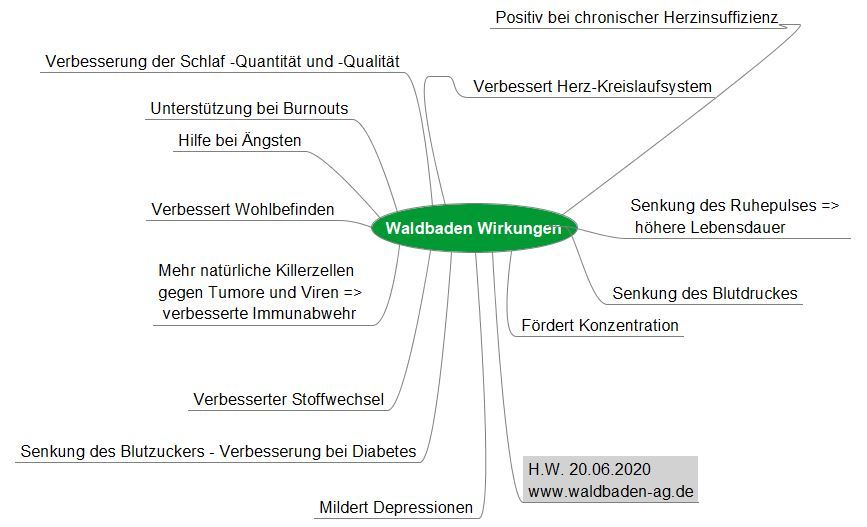Wissenschaft - Waldbaden
Hauptmenü:
Wissenschaft
Waldbaden und Wissenschaft
Achtsamkeit
zu entschleunigen und dadurch die Resilienz (psychische Belastbarkeit) zu erhöhen.
Wissenschaftliche Untersuchungen haben eine Vielzahl von positiven Wirkungen auf die Gesundheit bestätigt.
Wissenschaftliche Untersuchungen haben eine Vielzahl von positiven Wirkungen auf die Gesundheit bestätigt.
Mindmap als Zusammenfassung "Wissenschaft Waldbaden"
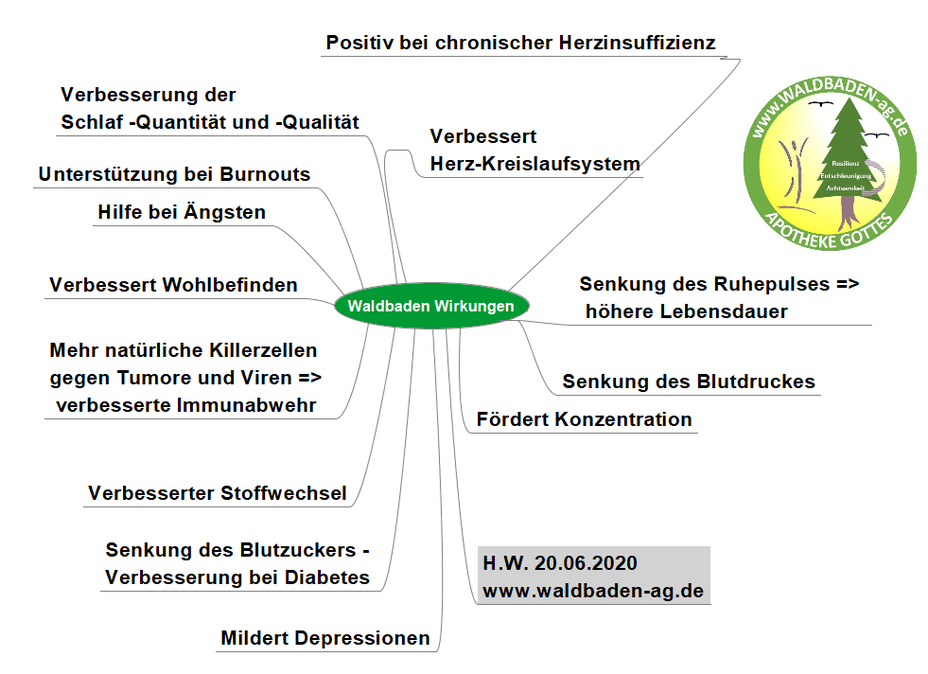
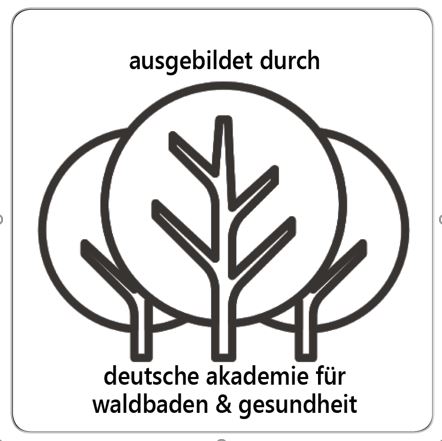

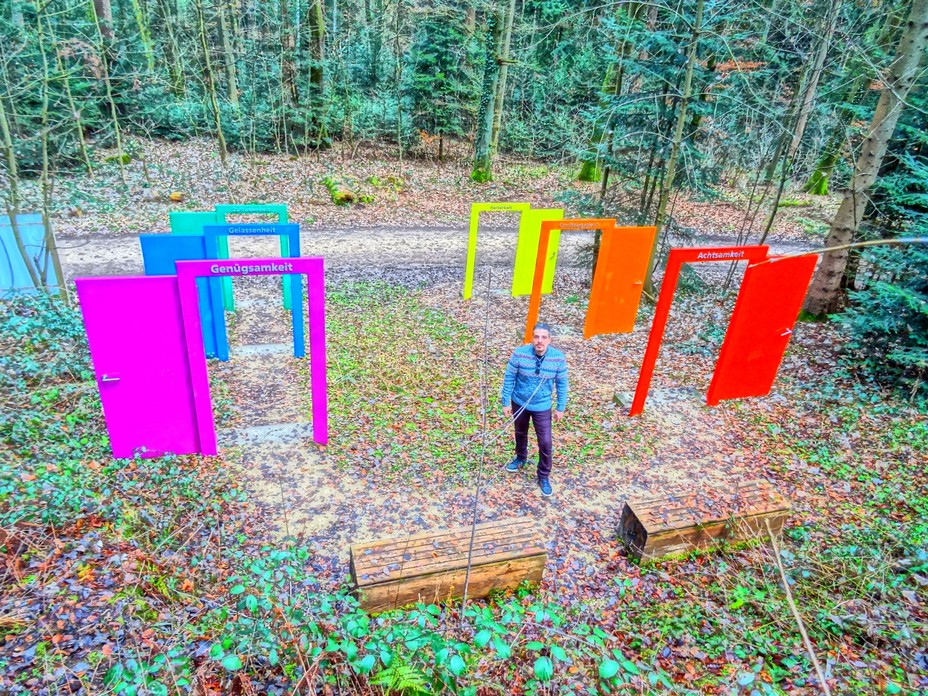

Wissenschaft Waldbaden, Mindmap Wirkungen Waldbaden, Herbert Wölfel 20.06.2020

Herbert Wölfel, Schönblick Schwäbisch Gmünd

Die Theorie hinter dem Waldbaden

Waldbaden (wörtlich übersetzt) kommt aus Japan und heißt dort und auch bei uns „Shinrin Yoku“.
森 林 浴
森 Shin = Großer WALD
林 rin = HOLZ
浴 Yoku = BADEN
Häufig wird es auch mit
„Eintauchen in die gesunde Atmosphäre des Waldes“
übersetzt.1982 bereits schlägt die japanische Forstagentur „Waldbäder“ als gesunden Lebensstil vor.
Achtsam und ohne Absicht schlendern und Verweilen im Wald bei weit geöffneten Sinnen – das ist Waldbaden. Mit achtsamen Körper- und Wahrnehmungsübungen wird man dabei von einer Kursleiterin / einem Kursleiter für Waldbaden begleitet. Das Tempo ist auf den Einzelnen oder die Bedürfnisse der Kleingruppe zugeschnitten. Ein immer wiederkehrendes Prinzip beim Waldbaden ist, durch Achtsamkeit zu entschleunigen und dadurch die Resilienz (psychische Belastbarkeit) zu erhöhen. Um die therapeutischen Wirkungen wissenschaftlich zu untermauern, startete das japanische Ministerium für Land- und Forstwirtschaft und Fischerei 2004 ein dreijähriges Forschungsprojekt. 2007 wurde die „Japanische Gesellschaft für Wald-Medizin“ gegründet, deren Präsident Dr. Qing Li ist. Er hat auch den Begriff „Shinrin Yoku“ mitgeprägt. Es gilt in Japan als eine effektive Stress-Management-Methode und ist fester Bestandteil des staatlichen Gesundheitssystems. Dort gibt es Waldbaden sogar auf Rezept. Seit 2012 können Studierende an japanischen Universitäten eine fachärztliche Spezialisierung in Waldmedizin belegen. A)
Nach den Ergebnissen aus Studien von
Prof. Dr. Qing Li (Nippon Medical School, Tokio),
einem der führenden Waldbaden-Professoren und Autoren, hilft regelmäßiges Waldbaden bei
Ängsten, Burnouts sowie Depressionen und dem Abbau von Stresswirkungen
durch Reduzierung der Stresshormone Cortisol und Adrenalin.
Außerdem baut der menschliche Körper bereits an einem einzigen Tag im Wald laut Clemens G. Arvay bis zu
40% mehr natürliche Killerzellen
auf und verbessert somit lt. Prof. Dr. Qing Li die Immunabwehr, Shinrin Yoku kann das
Herz-Kreislaufsystem stärken und kann bei
Atem- und Lungenerkrankungen, Schlafstörungen sowie Konzentrationsproblemen
zur Besserung verhelfen. „Der japanische Mediziner Prof. Dr.Qing Li konnte nachweisen, dass die Zahl und Aktivität der natürlichen Killerzellen im Blut schon nach einem Tag im Wald beachtlich ansteigt. Wer an zwei Tagen ein paar Stunden zwischen den Bäumen verbringt, kann die
Anzahl seiner Killerzellen sogar um mehr als 50 Prozent erhöhen.
Killerzellen sind Teil des Immunsystems und erkennen und zerstören kranke Körperzellen. Der positive Effekt hielt den Forschungen des Immunologen zufolge zwischen sieben und 30 Tage lang an. Er sieht darin den Beweis dafür, dass die Kraft der Bäume auch
organischen Leiden wie Krebs vorbeugen kann.“ 4)
Im Wald kommunizieren die Pflanzen durch die Luft über Terpene in den ätherischen Ölen und chemisch unterirdisch per „wood wide web“, um sich gegen Schädlinge zu schützen, Nährstoffe auszutauschen und Nachbarn vor einer bevorstehenden Dürre zu warnen. Über die Haut und den Atem nehmen wir gesundheitsfördernde Terpene auf.
Jenniver Evans schreibt in 4)
„Der Wald kann aber noch mehr, wie unter anderem Untersuchungen der Universität Wien belegen. Bei einem Spaziergang unter Bäumen schlägt nämlich
das Herz ruhiger,
der Blutdruck sinkt
und die Muskeln entspannen sich.
Zu ähnlichen Ergebnissen kam ein Team von Wissenschaftlern an der Universität Chicago und stellte fest: Je mehr Bäume in einer Wohngegend stehen, desto seltener entwickeln die Bewohner dort Herz-Kreislauf-Erkrankungen, Bluthochdruck oder Diabetes. Dazu glichen die Forscher Gesundheitsdaten mit der Baumdichte eines bestimmten Häuserblocks im kanadischen Toronto ab. Demnach sank das biologische Alter der Bewohner um sieben Jahre, wenn sie rund zehn Bäume mehr in ihrer Nachbarschaft hatten.“
Erstaunliches findet man auch bei der „Healing Architektur“ in einer 1984 im Wissenschaftsmagazin Science veröffentlichten Studie des Architekturprofessors Roger Ulrich. Dort wurden zwei Gruppen von Patienten verglichen, die im Krankenhaus nach identischen Operationen durch ihre Zimmerfenster entweder auf einen Park mit Bäumen oder auf die Betonmauer des Nachbargebäudes sehen konnten. Patienten, die auf den Park sehen konnten, benötigten deutlich
weniger Schmerzmittel,
litten seltener an Depressionen
und konnten im Schnitt einen Tag früher nach Hause entlassen werden, als die Patienten der Vergleichsgruppe.[2] In der Folgezeit erschienen zahlreiche weitere Studien, die sich mit ähnlichen Fragestellungen befasst haben. 2) 3)
[
https://www.ardmediathek.de/video/freizeit/schmidt-max-badet-im-wald/br-fernsehen/Y3JpZDovL2JyLmRlL2Jyb2FkY2FzdC9XT046MzE1NDIyMTk3ODEzX0YyMDE4V08wMTcxMTVBMDpjaGFubmVsXzI4MTA3
Sie wollen es genauer wissen?
Verwendete Literatur
A) Ausbildungsskript „Kursleiter/in für Waldbaden – Achtsamkeit im Wald, Jasmin Schlimm-Thierjung, Deutsche Akademie für Waldbaden & Gesundheit
Waldbaden – das kleine Übungshandbuch
Ulli Felber (2018)
ISBN 978-3-8434-5169-7
Waldbaden mit allen Sinnen
Rainer Schall (2019)
ISBN 978-3-44016598-9
Waldbaden – mit der heilenden Kraft
Annette Vernjus & A. Cavelius (2018)
ISBN 978-3-86882-918-1
Gebrauchsanweisung für den Wald
Peter Wohlleben (2017)
ISBN 978-3-492-27984-9
Im Waldsein
Dr. Melanieh Adamek (2018)
ISBN 978-3- 936798- 17-3
Der Heilungscode der Natur
Clemens G. Arvay, Riemann Verlag, München 2016,
ISBN 978-3-442-15945-1
Die wertvolle Medizin des Waldes
Dr. Qing Li, Rowohlt, 2018
ISBN 978-3-499-63401-7
Der Biophila Effekt
Clemens G. Arvay (2016)
ISBN 978-3-548-37659-2
Benutzte Links
1) https://www.bild.de/ratgeber/gesundheit/heilen-wirkung-3335090.bild.html Homepage besucht 16.06.2020
2) Roger S. Ulrich: View through a window may influence recovery from surgery. Science, 27. April 1984, 224 - 420(2), aus Homepage 3) besucht 20.06.2020
3) https://de.wikipedia.org/wiki/Healing Architecture, Homepage besucht 20.06.2020
4) https://www.pharmazeutische-zeitung.de/besuch-bei-dr-wald/ Jennifer Evans, 24.10.2018, Homepage besucht 20.06.2020
5) https://www.rnz.de/panorama/magazin_artikel,-japanisches-waldbadder-neue-gesundheitstrend-heisst-shinrin-yoku-_arid,361011.html, 20.06.2020
6) https://www.sdw-rems-murr.de/wald-bibliothek/archiv-veranstaltungen/was-ist-waldbaden/, 20.06.2020
7) https://www.mindfulmind.ch/wissenschaft-und-waldbaden/, 20.06.2020
8) http://christinepepersack.de/29-tricks-kreativitaet/ 22.06.2020
Weitere Literaturangaben:
(Entnommen aus https://www.mindfulmind.ch/wissenschaft-und-waldbaden/, zuletzt besucht 20.06.2020)
2019
• 190901 Djernis et al. (2019), A Systematic Review and Meta-Analysis of Nature-Based Mindfulness: Effects of Moving Mindfulness Training into an Outdoor Natural Setting.
• 190622 Furuyashiki et al. (2019), A comparative study of the physiological and psychological effects of forest bathing (Shinrin-yoku) on working age people with and without depressive tendencies.
• 190613 White et al. (2019), Spending at least 120 minutes a week in nature is associated with good health and wellbeing.
• 190516 Corazon et al. (2019), Psycho-Physiological Stress Recovery in Outdoor Nature-Based Interventions: A Systematic Review of the Past Eight Years of Research.
• 190516 Farrow & Washburn (2019), A Review of Field Experiments on the Effect of Forest Bathing on Anxiety and Heart Rate Variability.
• 190404 Hunter et al. (2019), Urban Nature Experiences Reduce Stress in the Context of Daily Life Based on Salivary Biomarkers.
• 190115 Song et al. (2019), Effects of Walking in a Forest on Young Women.
• 180327 Tsao et al. (2018), Health effects of a forest environment on natural killer cells in humans: an observational pilot study.
• 180211 Hassan et al. (2018), Effects of Walking in Bamboo Forest and City Environments on Brainwave Activity in Young Adults.
• 180201 Mao et al. (2018), Additive Benefits of Twice Forest Bathing Trips in Elderly Patients with Chronic Heart Failure.
• 180126 Song et al. (2018), Physiological Effects of Visual Stimulation with Forest Imagery.
2017
• 170817 Ideno et al. (2017), Blood pressure-lowering effect of Shinrin-yoku (Forest bathing): a systematic review and meta-analysis.
• 170809 Yu et al. (2017), Effects of Short Forest Bathing Program on Autonomic Nervous System Activity and Mood States in Middle-Aged and Elderly Individuals.
• 170728 Hansen et al. (2017), Shinrin-Yoku (Forest Bathing) and Nature Therapy: A State-of-the-Art Review.
• 170401 Cho et al. (2017), Terpenes from Forests and Human Health.
• 170331 Mao et al. (2017), The Salutary Influence of Forest Bathing on Elderly Patients with Chronic Heart Failure.
2016
• 160803 Song et al. (2016), Physiological Effects of Nature Therapy: A Review of the Research in Japan.
• 160714 Li et al. (2016), Effects of Forest Bathing on Cardiovascular and Metabolic Parameters in Middle-Aged Males.
• 160329 Poulsen et al. (2016), ‚Everything just seems much more right in nature‘: How veterans with post-traumatic stress disorder experience nature-based activities in a forest therapy garden.
• 160329 Jia et al. (2016), Health Effect of Forest Bathing Trip on Elderly Patients with Chronic Obstructive Pulmonary Disease.
2015
• 151201 Ochiai et al. (2015), Physiological and Psychological Effects of a Forest Therapy Program on Middle-Aged Females.
• 151201 Kang et al. (2015), Relief of Chronic Posterior Neck Pain Depending on the Type of Forest Therapy: Comparison of the Therapeutic Effect of Forest Bathing Alone Versus Forest Bathing With Exercise.
• 151109 Song et al. (2015), Physiological and Psychological Effects of a Walk in Urban Parks in Fall.
• 150417 Song et al. (2015), Elucidation of a Physiological Adjustment Effect in a Forest Environment: A Pilot Study.
• 150302 Song et al. (2015), Effect of forest walking on autonomic nervous system activity in middle-aged hypertensive individuals: a pilot study.
• 150625 Joung et al. (2015), The Prefrontal Cortex Activity and Psychological Effects of Viewing Forest Landscapes in Autumn Season.
• 150225 Ochiai et al. (2015), Physiological and psychological effects of forest therapy on middle-aged males with high-normal blood pressure.
• 150205 Lee et al. (2015), Acute Effects of Exposure to a Traditional Rural Environment on Urban Dwellers: A Crossover Field Study in Terraced Farmland.
2014
• 140715 Takayama et al. (2014), Emotional, restorative and vitalizing effects of forest and urban environments at four sites in Japan.
• 140501 Song et al. (2014), Physiological and psychological responses of young males during spring-time walks in urban parks.
• 140101 Ikei et al. (2014), Physiological and psychological effects of viewing forest landscapes in a seated position in one-day forest therapy experimental model.
• 140101 Lee et al. (2014), Influence of forest therapy on cardiovascular relaxation in young adults.
• 140101 Park et al. (2014), Physiological and psychological effects of walking in stay-in forest therapy.
• 140101 Miyazaki et al. (2014), Forest medicine research in Japan.
• 140101 Li & Kawada (2014), Possibility of clinical applications of forest medicine.
2013
• 131029 Song et al. (2013), Physiological and psychological effects of walking on young males in urban parks in winter.
• 130101 Park et al. (2013), Effect of the forest environment on physiological relaxation using the results of field tests at 35 sites throughout Japan.
• 130101 Ohtsuka (2013), Effect of the forest environment on blood glucose.
2012
• 121201 Mao et al. (2012), Therapeutic effect of forest bathing on human hypertension in the elderly.
• 120625 Mao et al. (2012), Effects of short-term forest bathing on human health in a broad-leaved evergreen forest in Zhejiang Province, China.
2011
• 110901 Lee et al. (2011), Physiological benefits of forest environment: based on field research at 4 sites.
• 110901 Tsunetsugu et al. (2011), Psychological relaxation effect of forest therapy: results of field experiments in 19 forests in Japan involving 228 participants.
• 110901 Morita et al. (2011), No association between the frequency of forest walking and blood pressure levels or the prevalence of hypertension in a cross-sectional study of a Japanese population.
• 110323 Li et al. (2011), Acute effects of walking in forest environments on cardiovascular and metabolic parameters.
• 110201 Lee et al. (2011), Effect of forest bathing on physiological and psychological responses in young Japanese male subjects.
2010
• 100601 Li et al. (2010), A day trip to a forest park increases human natural killer activity and the expression of anti-cancer proteins in male subjects.
• 100115 Li (2010), Effect of forest bathing trips on human immune function.
• 100115 Park et al. (2010), The physiological effects of Shinrin-yoku (taking in the forest atmosphere or forest bathing): evidence from field experiments in 24 forests across Japan.
• 100101 Tsunetsugu et al. (2010), Trends in research related to „Shinrin-yoku“ (taking in the forest atmosphere or forest bathing) in Japan.
2009
• 091222 Li et al. (2009), Effect of phytoncide from trees on human natural killer cell function.
2008
• 081008 Li et al. (2008), Phytoncides (Wood Essential Oils) Induce Human Natural Killer Cell Activity.
• 080401 Li et al. (2008), Relationships Between Percentage of Forest Coverage and Standardized Mortality Ratios (SMR) of Cancers in all Prefectures in Japan.
• 080301 Li et al. (2008), A forest bathing trip increases human natural killer activity and expression of anti-cancer proteins in female subjects.
• 080301 Li et al. (2008), Visiting a forest, but not a city, increases human natural killer activity and expression of anti-cancer proteins.
2007
• 20070620 Li et al. (2007), Forest bathing enhances human natural killer activity and expression of anti-cancer proteins.
• 070326 Tsunetsugu et al. (2007), Physiological effects of Shinrin-yoku (taking in the atmosphere of the forest) in an old-growth broadleaf forest in Yamagata Prefecture, Japan.
• 070326 Park et al. (2007), Physiological effects of Shinrin-yoku (taking in the atmosphere of the forest)–using salivary cortisol and cerebral activity as indicators.
• 070101 Morita et al. (2007), Psychological effects of forest environments on healthy adults: Shinrin-yoku (forest-air bathing, walking) as a possible method of stress reduction.
2006
• 060301 Yamaguchi et al. (2006), The effects of exercise in forest and urban environments on sympathetic nervous activity of normal young adults.
• 060228 Li et al. (2006), Phytoncides (wood essential oils) induce human natural killer cell activity.
1998
• 980201 Ohtsuka et al. (1998), Shinrin-yoku (forest-air bathing and walking) effectively decreases blood glucose levels in diabetic patients.
1984
• 840427 Ulrich (1984), View through a window may influence recovery from surgery.
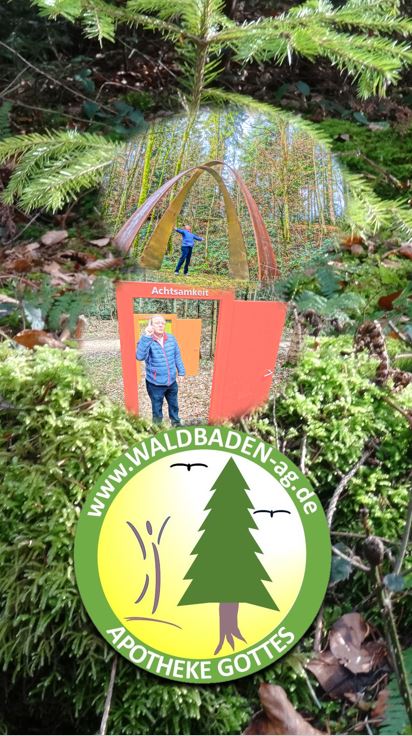
Waldbaden Wissenschaft
Mindmap zu Waldbaden Wissenschaft
